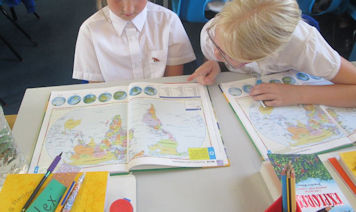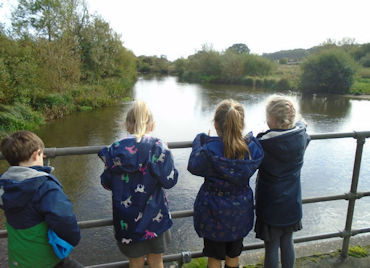Geography
Intent: Exploring how our planet ‘fits together’, as well as knowing about the serious natural and environmental challenges facing Earth, will support individuals to make informed and ethical choices about how to they wish to lead their lives as responsible global citizens and inspire in our pupils a curiosity and fascination about the world and its people.
Our geography curriculum has been ‘crafted’ to stimulate children’s interest, curiosity and wonder in their surroundings and develop a knowledge and understanding of the physical and human processes which shape places. Our geography curriculum has been designed to increase children’s knowledge of other cultures and, in doing so, teach a respect and understanding of what it means to be a positive citizen in a multi-cultural country. Through our curriculum, pupils have the opportunity to make sense of environmental issues and how they affect our world today.

It is important that children develop the skills of a geographer by fully immersing them in all areas of the subject. Our curriculum develops pupils use of geographical skills, including how to use, draw and interpret maps of different scales, and the vocabulary necessary to carry out effective geographical enquiry.
Our geography curriculum takes advantage of the unique geographical location of the school. For example, pupils learn about the settlement of Old Sarum by visiting it and learn about the the local rivers on field-study trips. School trips and fieldwork are provided to give first hand experiences, which enhance children’s understanding of the world beyond their locality.
The concepts for Geography at Stratford-sub-Castle Primary are:
- LOCATION: spatial awareness of different continents, countries and the names and locations of major physical and human features
- PLACE: similarities and differences between different areas of our own country and other places in the world
- ENVIRONMENT, PHYSICAL AND HUMAN GEOGRAPHY: processes and patterns in the natural environment; the different features of the Earth’s surface created by people, including buildings, cities
- GEOGRAPHY SKILLS: using maps and atlases to describe, interpret and analyse our world;
- FIELDWORK: how we can observe, measure and analyse geographical processes for ourselves, outside the classroom using first-hand experiences

Implementation: Learning is embedded through the development of knowledge and skills over time and through the teaching of overlapping concepts. Progression is mapped coherently. Subject specific vocabulary, as well as ‘enabling knowledge’, which aids future learning, has been identified as part of the mapping process. This ‘Progression Map’ allows for effective planning and assessment. Teachers use it to craft units of work which are ‘blocked’ to provide continuity of learning, to engineer the immersion of pupils in their studies, use resources effectively and to facilitate links within and between subjects. The key components of each unit of work are regularly revisited and reviewed in order to embed learning.
Impact:
- Pupil Voice: Pupil engage and enjoy their geography learning so that are able to make informed and ethical choices about how to they wish to lead their lives as responsible global citizens. Pupil’s geography learning inspire a curiosity and fascination about the world and its people.
- Evidence in Knowledge: Pupils have a good knowledge of countries around the world and compare them to the UK. Pupils are able to describe how human and physical processes affect our landscape.
- Evidence in Skills: Pupils can use maps and atlases to locate places. Pupils can use OS grid references and latitude/longitude co-ordinates. Pupils are less familiar with using fieldwork to learn about the local area. Pupils are able to use the acquired vocabulary appropriately.
- Breadth and Depth: Teachers plan a range of opportunities for pupils to learn Geography and link to other areas of the curriculum (ie use of statistics).



